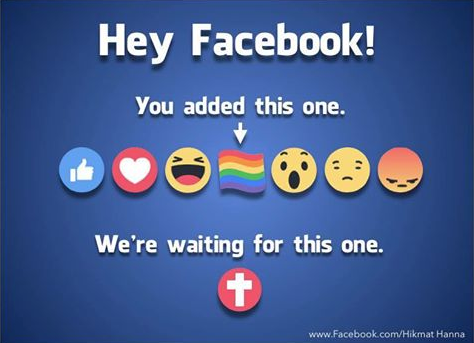Facebook has found itself in the midst of another controversy—this time over the addition and very public omission of reaction emojis.
In early June, the social network rolled out a rainbow flag reaction emoji to coincide with Pride Month and honor the LGBTQ community. The new emoticon was met with excitement, especially in the wake of the passing of the flag’s creator, Gilbert Baker, in March. According to Facebook, the emoji was meant to “celebrate love and diversity” and reaffirm the company’s positioning as “a platform that supports all communities.”
Mark Zuckerberg Speaks of Future in which Facebook Replaces Churches
Given the clearly stated goal of building a network that is open to “all communities,” it stands to reason Facebook would consider adding other reaction emojis beyond the existing faces, thumbs up, heart, and Pride flag, especially ones that would resonate with around 80% of the country, but that doesn’t seem to be the case.
On June 24, Facebook user Hikmat Hanna posted an image to Facebook imploring the social media site to consider adding a cross reaction emoji to the mix. Prominent evangelist Joshua Feuerstein happened upon Hanna’s post and shared it with his own followers. HuffPost reports that Feuerstein’s post quickly went viral, racking up some 19,000 likes and nearly 10,000 shares in just a few days.
https://www.facebook.com/joshua.feuerstein.5/photos/a.443484622420892.1073741828.443476065755081/1060498464052835/?type=3
Despite the overwhelming response to the suggestion, don’t expect to see a cross in your News Feed any time soon. In a terse statement to HuffPost, Facebook firmly came down against the idea, saying, “This reaction is not actually available on Facebook, and is not something we’re working on.”
The curt refusal comes on the heels of eyebrow raising comments Facebook founder Mark Zuckerberg made at a conference last month. As Faithwire reported, Zuckerberg boasted of Facebook’s new artificial intelligence capabilities that are helping to organize the site’s two billion users into data-driven groups, while dreaming of a world in which his social network would one day replace churches and Little League teams as the basis of communities.
“We started a project to see if we could get better at suggesting groups that will be meaningful to you,” he explained. “We started building artificial intelligence to do this. And it works. In the first 6 months, we helped 50% more people join meaningful communities.”
“It’s so striking that for decades, membership in all kinds of groups has declined as much as one-quarter,” he continued. “That’s a lot of of people who now need to find a sense of purpose and support somewhere else.”
H/T: Daily Mail


